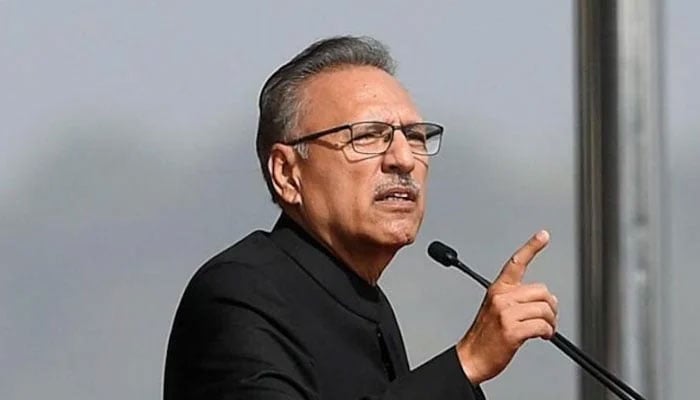President Arif Alvi refuses to give assent to election amendment bill
President Arif Alvi says that it was “very painful” for him as head of state to not sign a bill passed by Majlis Shoora
ISLAMABAD: President Dr Arif Alvi has once again refused to sign the election amendment bill that he had returned as he believes the legislation is “regressive" and urged Parliament to consider the use of technology in the elections.
A statement issued by the president’s secretariat on Sunday said that Dr Alvi “has not signed the bill despite the fact, that the constitution that he upholds, will make it into law”.
President Alvi, while referring to Article 75 (2) of the Constitution, said that it was “very painful” for him as the head of state to not sign a bill passed by Majlis Shoora. He also enlisted his reasons for “posterity”
The president in his reasoning mentioned that apart from the laws’ being regressive, he strongly believes that technology, especially electronic voting machines when used judiciously provides solutions that reduce the impact of confusion, discord and accusations in our "ever-marred" and challenged election processes.
“Technology can also improve transparency, make elections inclusive with the vote of our overseas Pakistanis, build confidence and reduce polarisation to finally achieve our elusive dream of free and fair elections,” said President Alvi.
Apart from this, the president also stated that he wants “Pakistan to leapfrog into the world of tomorrow, not to solve today’s problems only through the lens and experiences of yesterday but through newer and better scientific approaches that are available, or even ‘birthing’ today”.
The head of the state also admitted that this can only happen with confidence-building measures across the aisles, and broad stakeholder involvement.
“Why was this not done and why the obvious was not visible to the opinion and decision makers will remain an enigma to him,” said Dr Alvi.
“The present and future governments and parliaments will be facing two choices, whether to allow the past to drag Pakistan down or allow the lessons from the past and technologies of today to boost us into the bright progressive and dynamic future of Pakistan that has been our dream,” said the president.
He also observed that “many such decisions” will challenge the country in the future, and history has shown that countries that make the right decisions ‘rise’, and those who don't, squander opportunities that obstruct their path to glory.
On June 9, Parliament's joint session passed the Elections (Amendment) Bill, 2022, and National Accountability (Amendment) Bill, 2022, returned by President Arif Alvi.
The election amendment bill was seeking to abolish the use of electronic voting machines (EVMs) in polls, while the NAB bill has formulated a post-retirement procedure for its chairman, among other changes.
Law Minister Azam Nazeer Tarrar presented both the bills, which the president had returned to Prime Minister Shahbaz Sharif as he "was not informed" about the legislative proposal under Article 46 before they were tabled.
But after the joint sitting's nod, the bills were once again sent to the president for approval.
The 10-day expiry for giving assent to the bill expires todays. The fate of the NAB law is unclear for now but the election bill has been rejected by the president.
If the president had not returned the bill within 10 days then it would have been considered that his assent has been given.
-
Security forces gun down 30 terrorists in multiple IBOs in KP: ISPR
-
MQM-P calls for new province in Sindh
-
US report validates Pakistan military edge over India: PM
-
Banned TTP poses serious threat to Pakistan security: UNSC panel
-
CM Afridi clarifies remarks on by-poll after ECP requests army deployment
-
Dubai sees 3.2m Pakistani passengers in 2025 as airport sets new milestone
-
Security forces kill 23 Indian proxy terrorists in KP's Kurram
-
Pakistan to construct island to boost oil exploration: report












